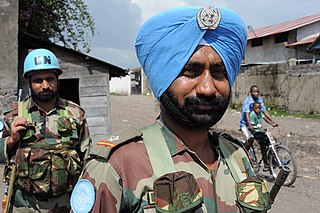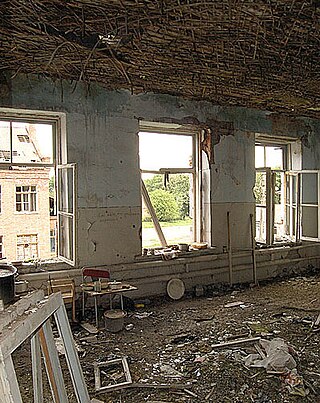
Peacekeeping comprises activities, especially military ones, intended to create conditions that favor lasting peace. Research generally finds that peacekeeping reduces civilian and battlefield deaths, as well as reduces the risk of renewed warfare.
United Nations Security Council Resolution 1325 (S/RES/1325), on women, peace, and security, was adopted unanimously by the UN Security Council on 31 October 2000, after recalling resolutions 1261 (1999), 1265 (1999), 1296 (2000), and 1314 (2000). The resolution acknowledged the disproportionate and unique impact of armed conflict on women and girls. It calls for the adoption of a gender perspective to consider the special needs of women and girls during conflict, repatriation and resettlement, rehabilitation, reintegration, and post-conflict reconstruction.

United Nations Security Council Resolution 1674, adopted unanimously on April 28, 2006, after reaffirming resolutions 1265 (1999) and 1296 (2000) concerning the protection of civilians in armed conflict and Resolution 1631 (2005) on co-operation between the United Nations and regional organisations, the Council stressed a comprehensive approach to the prevention of armed conflict and its recurrence.

United Nations Security Council Resolution 1925, adopted unanimously on May 28, 2010, after reaffirming previous resolutions on the situation in the Democratic Republic of the Congo, the Council extended the mandate of the United Nations Mission in the Democratic Republic of Congo (MONUC) until June 30, 2010, authorised a withdrawal of 2,000 troops and decided that from July 1, 2010, MONUC would be known as the United Nations Organization Stabilization Mission in the Democratic Republic of the Congo (MONUSCO) with a mandate until June 30, 2011.

United Nations Security Council resolution 1400, adopted unanimously on 28 March 2002, after recalling all previous resolutions on the situation in Sierra Leone, the Council extended the mandate of the United Nations Mission in Sierra Leone (UNAMSIL) for a further six months until 30 September 2002 in the run up to the May 2002 general elections.

United Nations Security Council resolution 1493, adopted unanimously on 28 July 2003, after recalling all resolutions on the situation in the Democratic Republic of the Congo, the council extended the mandate of the United Nations Mission in the Democratic Republic of Congo (MONUC) until 30 July 2004 and raised its troop level from 8,700 to 10,800.

United Nations Security Council resolution 1539, adopted unanimously on 22 April 2004, after recalling resolutions 1261 (1999), 1308 (2000), 1314 (2000), 1325 (2000), 1379 (2001) and 1460 (2003), the council condemned the use of child soldiers and asked the Secretary-General to devise a monitoring mechanism.

United Nations Security Council Resolution 1944, adopted unanimously on October 14, 2010, after recalling previous resolutions on Haiti, including resolutions 1542 (2004), 1576 (2004), 1608 (2005), 1658 (2006), 1702 (2006), 1743 (2006), 1780 (2007), 1840 (2008), 1892 (2009), 1908 (2010) and 1927 (2010), the Council renewed the mandate of the United Nations Stabilization Mission in Haiti (MINUSTAH) until October 15, 2011.

United Nations Security Council Resolution 1952, adopted unanimously on November 29, 2010, after recalling previous resolutions on the situation in the Democratic Republic of the Congo, including resolutions 1807 (2008), 1857 (2008) and 1896 (2009), the Council renewed an arms embargo and related targeted sanctions for a further period until November 30, 2011.

United Nations Security Council Resolution 1592, adopted unanimously on 30 March 2005, after recalling all previous resolutions on the situation in the Democratic Republic of the Congo, including Resolution 1565 (2004), the Council extended the mandate of the United Nations Mission in the Democratic Republic of Congo (MONUC) until 1 October 2005.

United Nations Security Council resolution 1602, adopted unanimously on 31 May 2005, after recalling resolutions 1545 (2004), 1565 (2004), 1577 (2004) and 1596 (2005) on the situation in Burundi, the Council extended the mandate of the United Nations Operation in Burundi (ONUB) for a period of six months until 1 December 2005.

United Nations Security Council Resolution 1983 was adopted unanimously on June 7, 2011, after recalling meetings on HIV/AIDS in Africa and in the mandates of peacekeeping operations, as well as resolutions 1308 (2000), 1325 (2000), 1820 (2008), 1888 (2009), 1889 (2009), 1894 (2009) and 1960 (2010). The Council encouraged the inclusion of HIV/AIDS prevention, treatment, care and support in its peacekeeping mandates.

United Nations Security Council Resolution 1998, adopted unanimously on July 12, 2011, after reaffirming resolutions 1261 (1999), 1314 (2000), 1379 (2001), 1460 (2003), 1539 (2004), 1612 (2005) and 1882 (2009) on the protection of children in armed conflict, the Council declared schools and hospitals off limits for both armed groups and military activities, asking the Secretary-General for such crimes to be placed on a list of those committing "grave violations" against children.
United Nations Security Council Resolution 1820 was unanimously adopted on 19 June 2008. It condemns the use of sexual violence as a tool of war, and declares that “rape and other forms of sexual violence can constitute war crimes, crimes against humanity or a constitutive act with respect to genocide”. The adoption of the resolution marked the first time that the UN explicitly linked sexual violence as a tactic of war with women, peace, and security issues. Security Council Resolution 1820 reinforces United Nations Security Council Resolution 1325 and highlights that sexual violence in conflict constitutes a war crime and demands parties to armed conflict to immediately take appropriate measures to protect civilians from sexual violence, including training troops and enforcing disciplinary measures. In November 2010, the UN Secretary General presented a report on the implementation of UNSCR 1820.
United Nations Security Council Resolution 1882 was unanimously adopted on 4 August 2009.
United Nations Security Council Resolution 1888 was unanimously adopted on 30 September 2009. It was introduced by United States Secretary of State Hillary Clinton, who also presided over the session. The resolution established the United Nations Special Representative on Sexual Violence in Conflict.
The term international framework of sexual violence refers to the collection of international legal instruments – such as treaties, conventions, protocols, case law, declarations, resolutions and recommendations – developed in the 20th and 21st century to address the problem of sexual violence. The framework seeks to establish and recognise the right all human beings to not experience sexual violence, to prevent sexual violence from being committed wherever possible, to punish perpetrators of sexual violence, and to provide care for victims of sexual violence. The standards set by this framework are intended to be adopted and implemented by governments around the world in order to protect their citizens against sexual violence.

The Office of the Special Representative of the Secretary-General on Sexual Violence in Conflict (OSRSG-SVC) is an office of the United Nations Secretariat tasked with serving the United Nations' spokesperson and political advocate on conflict-related sexual violence, the Special Representative of the Secretary-General on Sexual Violence in Conflict (SRSG-SVC). The Special Representative holds the rank of Under-Secretary-General of the UN and chairs the UN Action Against Sexual Violence in Conflict. The mandate of the SRSG-SVC was established by Security Council Resolution 1888, introduced by Hillary Clinton, and the first Special Representative, Margot Wallström, took office in 2010. The current Special Representative is Pramila Patten of Mauritius, who was appointed by UN Secretary General António Guterres in 2017. The work of the SRSG-SVC is supported by the UN Team of Experts on the Rule of Law/Sexual Violence in Conflict, co-led by the Department of Peacekeeping Operations (DPO), Office of the High Commissioner for Human Rights (OHCHR) and the UN Development Programme (UNDP), also established under Security Council Resolution 1888.
International law is a series of verbal agreements and written contracts between nations that govern how those nations interact with one another. "Public" international law includes human rights both in conflict situations and post-conflict reconstruction. The Convention on the Elimination of All Forms of Discrimination against Women (CEDAW) was adopted by the United Nations General Assembly in 1979 and has the goal of promoting women's rights. Women have contributed to work on post-conflict reconstruction, aid and ceasefire negotiations. They have also contributed to the Geneva II peace talks regarding Syria, and were involved in the Rohingya conflict in Myanmar as 'front-line responders'.
United Nations Security Council Resolution 2388 condemned human trafficking, in particular by the Islamic State of Iraq and the Levant (IS), as well as human rights violations by various African terror groups. The resolution was passed in a 15–0 vote, unanimously adopted by members of United Nations Security Council (UNSC). on November 21, 2017.













